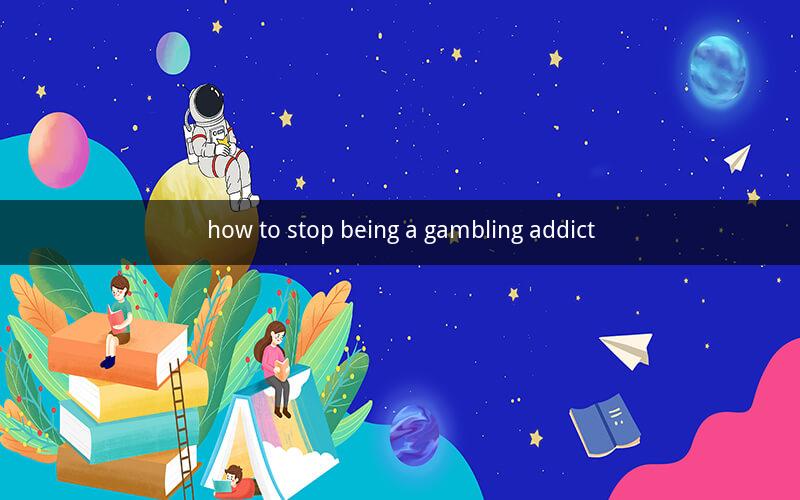
How to Stop Being a Gambling Addict: A Comprehensive Guide
Table of Contents
1. Understanding Gambling Addiction
2. The Signs and Symptoms of a Gambling Problem
3. The Psychological and Social Consequences of Gambling Addiction
4. Identifying Triggers and High-Risk Situations
5. Strategies for Building a Support System
6. Cognitive Behavioral Therapy for Gambling Addiction
7. Medications and Other Treatments
8. Self-Management Techniques
9. Preventing Relapse
10. Case Studies and Success Stories
1. Understanding Gambling Addiction
Gambling addiction, also known as problem gambling or compulsive gambling, is a behavioral disorder characterized by the inability to control the urge to gamble, despite negative consequences. It is a complex condition that can affect individuals of all ages, genders, and socioeconomic backgrounds. Understanding the nature of gambling addiction is the first step towards overcoming it.
2. The Signs and Symptoms of a Gambling Problem
Recognizing the signs and symptoms of a gambling problem is crucial for seeking help. Common indicators include:
- Preoccupation with gambling, even when not engaged in the activity
- Needing to bet more money to achieve the same thrill
- Chasing losses, trying to win back money that was lost
- Lying to family, friends, or therapists about gambling activities
- Missing work or social events due to gambling
- Risking significant financial, emotional, or relationship problems due to gambling
3. The Psychological and Social Consequences of Gambling Addiction
Gambling addiction can have severe psychological and social consequences, including:
- Financial problems, such as debt, bankruptcy, or theft
- Relationship issues, including marriage problems, infidelity, or family breakdown
- Legal problems, such as arrest or imprisonment
- Mental health issues, such as depression, anxiety, or substance abuse
- Physical health problems, such as insomnia, fatigue, or stress-related disorders
4. Identifying Triggers and High-Risk Situations
Identifying triggers and high-risk situations is essential for managing gambling addiction. Common triggers include:
- Emotional stress or anxiety
- Social pressure or peer influence
- Access to gambling opportunities, such as casinos or online platforms
- Exposure to gambling-related media or advertisements
5. Strategies for Building a Support System
Building a support system is crucial for overcoming gambling addiction. Strategies include:
- Seeking support from family and friends
- Joining a gambling anonymous group or support group
- Finding a therapist or counselor specializing in gambling addiction
- Participating in self-help groups, such as Gamblers Anonymous
6. Cognitive Behavioral Therapy for Gambling Addiction
Cognitive Behavioral Therapy (CBT) is a widely used treatment for gambling addiction. It focuses on identifying and changing negative thought patterns and behaviors associated with gambling. CBT techniques include:
- Identifying and challenging irrational beliefs
- Developing coping strategies for managing triggers and high-risk situations
- Learning to recognize and change self-destructive behaviors
- Building self-esteem and resilience
7. Medications and Other Treatments
In some cases, medications may be used to treat gambling addiction, particularly when co-occurring mental health disorders are present. These include:
- Antidepressants, such as SSRIs or SNRIs, to treat depression or anxiety
- Mood stabilizers or antipsychotics, to treat bipolar disorder or schizophrenia
- Naltrexone, a medication that blocks the pleasure associated with gambling
8. Self-Management Techniques
Self-management techniques can help individuals manage their gambling addiction on their own. These include:
- Setting strict limits on gambling time, money, and locations
- Avoiding high-risk situations and triggers
- Engaging in alternative activities to replace gambling
- Keeping a gambling diary to track progress and identify patterns
9. Preventing Relapse
Preventing relapse is a critical aspect of overcoming gambling addiction. Strategies include:
- Maintaining a strong support system
- Continuing therapy or counseling sessions
- Practicing self-management techniques
- Remaining vigilant for potential triggers and high-risk situations
10. Case Studies and Success Stories
Real-life case studies and success stories can provide inspiration and hope for individuals struggling with gambling addiction. These stories illustrate the challenges faced and the steps taken to overcome addiction, emphasizing the importance of seeking help and maintaining a commitment to recovery.
---
FAQs
1. What are the main causes of gambling addiction?
- Gambling addiction can result from a combination of factors, including genetic predisposition, environmental influences, and personal vulnerabilities.
2. Can gambling addiction be cured?
- While there is no guaranteed cure for gambling addiction, it can be effectively managed with appropriate treatment and support.
3. How long does it take to recover from gambling addiction?
- Recovery time varies for each individual, but many people experience significant improvement within a few months to a year of treatment.
4. Is there a medication that can cure gambling addiction?
- While there is no medication that can cure gambling addiction, certain medications can help manage symptoms and co-occurring mental health disorders.
5. Can I still enjoy gambling if I have a gambling addiction?
- It is generally recommended to avoid gambling altogether if you have a gambling addiction, as it can lead to relapse.
6. How can I get help for a loved one with a gambling addiction?
- Encourage your loved one to seek professional help and offer your support throughout the recovery process.
7. Are there any support groups for gambling addiction?
- Yes, there are many support groups available, such as Gamblers Anonymous and SMART Recovery, where individuals can share experiences and receive support.
8. Can therapy help me overcome my gambling addiction?
- Yes, therapy, particularly Cognitive Behavioral Therapy (CBT), can be an effective treatment for gambling addiction.
9. What should I do if I think I might have a gambling addiction?
- If you suspect you have a gambling addiction, it is important to seek help from a professional, such as a therapist or counselor.
10. Is it possible to recover from gambling addiction without professional help?
- While some individuals may recover without professional help, seeking support from professionals can significantly improve the chances of successful recovery.